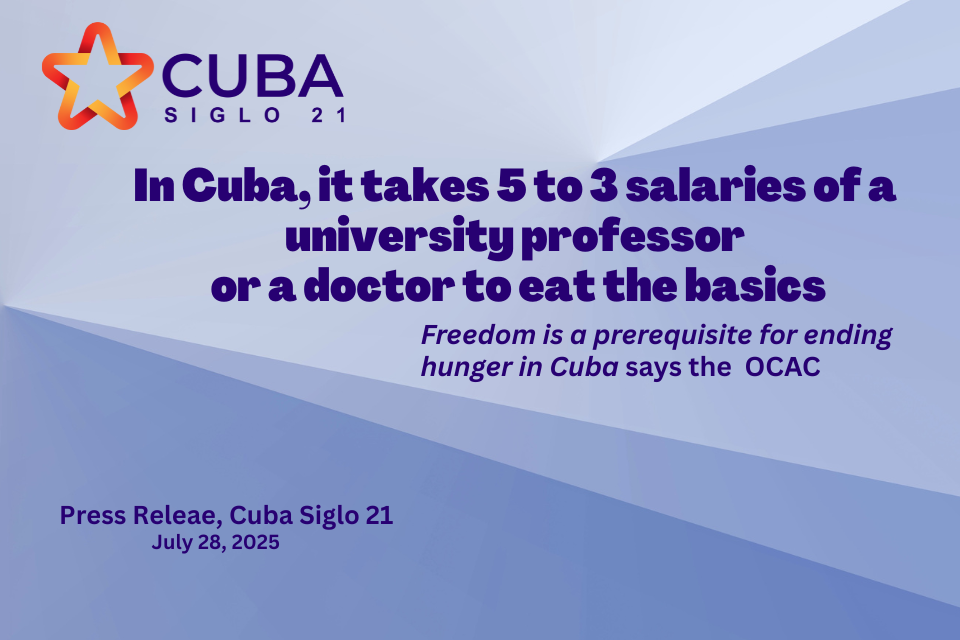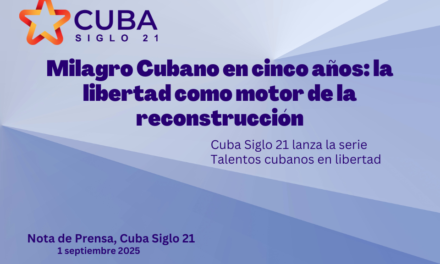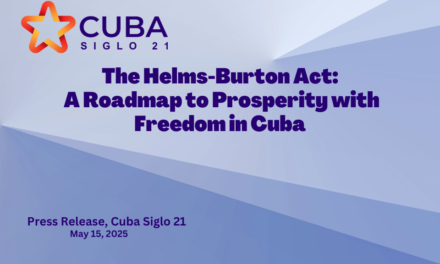Descargar informe completo
Download Complete Report in English
Ver Resumen en Español
See Summary in English
Freedom is a prerequisite for ending hunger in Cuba, says the Cuban Observatory for Citizen Auditing (OCAC)
July 28, 2025 — The food crisis in Cuba has reached dramatic levels, revealing the structural and systemic failure of the economic and productive regime. According to data from the World Food Program (WFP) and UNICEF, the country depends on international donations to guarantee minimum coverage of basic products, while more than 80% of the food consumed is imported, largely from the United States.
The recent Dossier “Cuban Regime is the Root Cause of Hunger” demonstrates that feeding oneself in Cuba has become an insurmountable challenge for most citizens. According to data compiled in June by the Cuban Citizen Audit Observatory (OCAC), a Cuban citizen needs at least 30,000 CUP per month to “eat poorly,” a figure equivalent to 14 minimum wages or 19 basic pensions. It takes 5 to 3 salaries of a university professor or a doctor to eat the basics. One Cuban Pesos equals 0.04 cents of US Dollars.
Even with the recently promised increase in the minimum pension starting in September—doubling it—almost 10 minimum pensions are needed to cover the basics of food. In other words, the populist measure announced will allow a Cuban pensioner to have enough money to eat three days a month, instead of the one and a half days they had in June, by the time of this investigation. This is without considering that the accelerating inflation will reduce the purchasing power of that increase in very little time.
The deterioration of the family basket is alarming. Essential products such as rice, beans, oil, eggs, and meat reach astronomical prices in informal markets. In Havana, a pound of rice costs up to 375 CUP, a carton of 30 eggs ranges from 2,700 to 3,500 CUP, and a pound of pork sells for over 1,000 CUP. Even previously affordable foods such as sweet potatoes and plantains have seen their prices increased tenfold in the last two years.
The ration book (Libreta de Abastecimiento), once a lifeline for many people, is now virtually collapsed. “Since May 2024, eggs have not been delivered, and products such as oil, coffee, and meat are a pipe dream,” the OCAC report notes. In June, rations were limited to two pounds of brown sugar, one pound of peas, and one packet of salt per person.
Cumulative inflation since the so-called Tarea Ordenamiento (2021) exceeds 220%, which has drastically reduced purchasing power. A minimum wage of 2,100 CUP or a pension of 1,528 CUP barely covers 5% of the monthly cost of the basic food basket. “Today in Cuba, those who eat lunch don’t eat dinner, and those who eat dinner don’t eat lunch,” says Roberto Pérez, a worker in Santiago de Cuba.
Without the countryside, there is no country, and with GAESA, there is no future
In response to this crisis, OCAC proposes a radical transformation of Cuban agriculture as part of the overall transformation of the national governance regime. In this regard, it takes up the five demands of the “Without the countryside there is no country” project, which has been ignored since 2020: freedom to produce and set prices, elimination of the Acopio forced sale of food production at state at fixed prices, immediate opening up to international trade without intermediaries for the private producers, a ten-year tax moratorium, and the granting of permanent property titles to farmers.
However, OCAC considers that five years after the original proposal by independent farmers would not be enough, thus is now expanding their proposal to encompass systemic structural measures. Among the first, it proposes the intervention and/or nationalization of the Grupo de Administración Empresarial S.A. (GAESA), to audit their books as well as to plan its future dissolution; the creation of an Agricultural Development Bank; the constitutional guarantee of private property rights; the opening of the economy to investment from the diaspora; and an international, neutral and reliable, supervision of investment projects. “Without a reliable legal framework and economic freedom, there will be no food on the Cuban table,” warns the organization.
“Hunger in Cuba is not an economic or climate problem, but essentially a political one,” the report concludes. “While the regime allocates 13 times more resources to construct empty hotels than to agriculture, millions of Cubans lack even a minimum food supply.” This is not an administrative error, but a deliberate policy to feed the coffers of the new oligarchy at the expense of the people’s hunger. OCAC’s diagnosis is clear: without a profound and comprehensive political and economic transformation, there will be no food on Cubans’ tables. Otherwise, hunger will continue to be the norm, not the exception.







